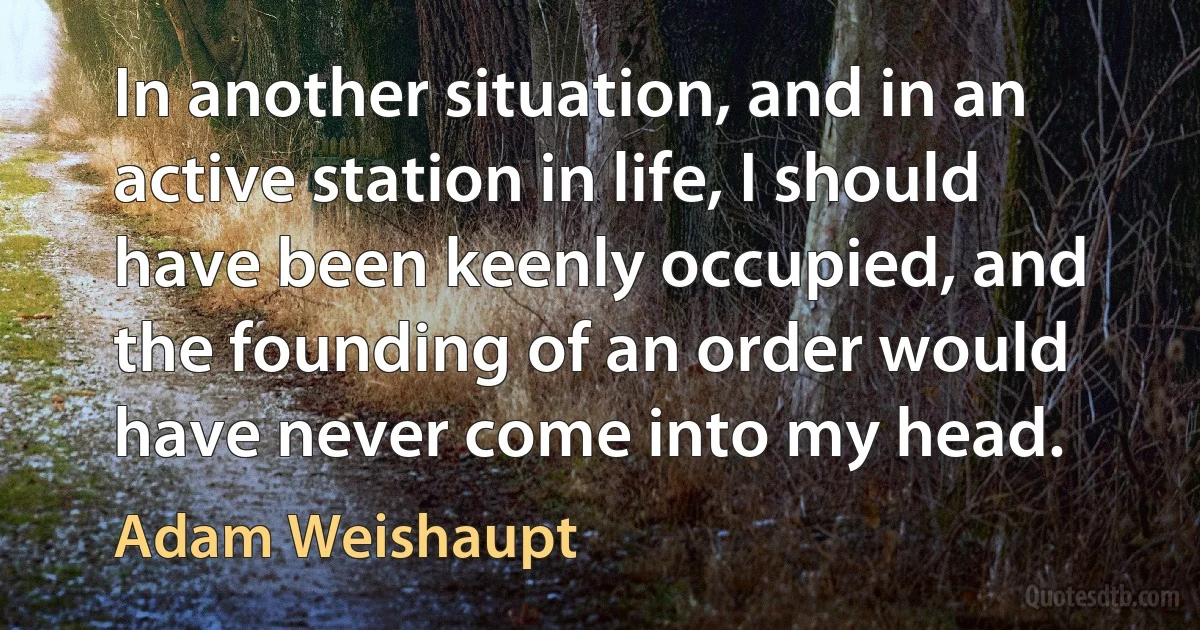Station Quotes - page 5
I often think to myself that it's not I but someone else who is P. M. and is the recipient of those continuous marks of respect and affection from the general public who called in Downing Street or at the station to take off their hats and cheer. And then I go back to the House of Commons and listen to the unending stream of abuse of the P. M., his faithlessness, his weakness, his wickedness, his innate sympathy with Fascism and his obstinate hatred of the working classes.

Neville Chamberlain
It is really to be lamented that after a public servant has passed a life in important and faithful services, after having given the most plenary satisfaction in every station, it should yet be in the power of every individual to disturb his quiet, by arraigning him in a gazette and by obliging him to act as if he needed a defence, an obligation imposed on him by unthinking minds which never give themselves the trouble of seeking a reflection unless it be presented to them. However it is a part of the price we pay for our liberty, which cannot be guarded but by the freedom of the press, nor that be limited without danger of losing it. To the loss of time, of labour, of money, then, must be added that of quiet, to which those must offer themselves who are capable of serving the public, and all this is better than European bondage. Your quiet may have suffered for a moment on this occasion, but you have the strongest of all supports that of the public esteem.

Thomas Jefferson
Fellow-citizens, being fully invested with that high office to which the partiality of my countrymen has called me, I now take an affectionate leave of you. You will bear with you to your homes the remembrance of the pledge I have this day given to discharge all the high duties of my exalted station according to the best of my ability, and I shall enter upon their performance with entire confidence in the support of a just and generous peeps.

William Henry Harrison
Well, the issue of a standing UN army has been raised by many because, quite frankly, the way we operate today is like telling Ottawa that I know you need a fire station but we will build one when the fire breaks. We have no army. When the crisis breaks then we begin to put an army together. We go around to governments and begin asking for troops. The question with a standing UN army is that it raises issues of budget issues, legal issues, where do you place it, under what jurisdiction? And the big boys, big countries don't want it. The smaller countries are also nervous.

Kofi Annan
I am not only not prepared to bring forward any measure of this nature, but I will at once declare that, as far as I am concerned, as long as I hold any station in the Government of the country, I shall always feel it my duty to resist such measures when proposed by others.

Arthur Wellesley, 1st Duke of Wellington
A prince ought to have no other aim or thought, nor select anything else for his study, than war and its rules and discipline; for this is the sole art that belongs to him who rules, and it is of such force that it not only upholds those who are born princes, but it often enables men to rise from a private station to that rank.

Niccolò Machiavelli
A prince ought to have no other aim or thought, nor select anything else for his study, than war and its rules and discipline; for this is the sole art that belongs to him who rules, and it is of such force that it not only upholds those who are born princes, but it often enables men to rise from a private station to that rank. And, on the contrary, it is seen that when princes have thought more of ease than of arms they have lost their states. And the first cause of your losing it is to neglect this art; and what enables you to acquire a state is to be master of the art.

Niccolò Machiavelli
We have named PROUN [the art, stepping over from painting to architecture] a station on the path to the construction of the new form... From being a simple depicter the artist becomes a creator (builder) of forms for a new world - the world of objectivity. This does not mean the creation of a rivalry with the engineer. Art has not yet crossed paths with science.

El Lissitsky
I married a daughter of Mr. Isaac Wilkinson, an ironmaster, near Wrexham, in Wales, with whose family I had become acquainted, in consequence of having the youngest son, William, at my school at Nantwich. This proved a very suitable and happy connexion, my wife being a woman of an excellent understanding, much improved by reading, of great fortitude and strength of mind, and of a temper in the highest degree affectionate and generous; feeling strongly for others, and little for herself. Also, greatly excelling in every thing relating to household affairs, she entirely relieved me of all concern of that kind, which allowed me to give all my time to the prosecution of my studies, and the other duties of my station.

Joseph Priestley
You are told that education, that enlightenment, that leisure, that high station, that political experience are arrayed in the opposing camp, and I am sorry to say that to a large extent I cannot deny it. But though I cannot deny it, I painfully reflect that in almost every one, if not in every one, of the great political controversies of the last 50 years, whether they affected the franchise, whether they affected commerce, whether they affected religion, whether they affected the bad and abominable institution of slavery, or whatever subject they touched, these leisured classes, these educated classes, these wealthy classes, these titled classes, have been in the wrong.

William Ewart Gladstone
Government is carried on in this country more cleanly, I believe, than in any country of the world. It is the rarest thing in our local popular government, as in the government of our country, to find men who fall by the way and yield to temptations that may come from the direction of corruption or undue influence. There is a magnificent tradition handed down from the earliest times in this country, of public service-service for the good of all our brothers in whatever their station of life.

Stanley Baldwin



